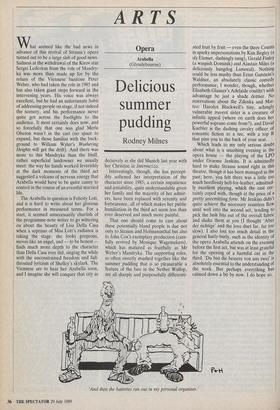ARTS
Opera
Arabella (Glyndcbournc)
Delicious summer pudding
Rodney Wiles
What seemed like the bad news in advance of this revival of Strauss's opera turned out to be a large slab of good news. Sadness at the withdrawal of the Kirov star Sergei Leiferkus from the role of Mandry ka was more than made up for by the return of the Viennese baritone Peter Weber, who had taken the role in 1985 and has also taken giant steps forward in the intervening years. His voice was always excellent, but he had an unfortunate habit of addressing people on stage, if not indeed the scenery, and his performance never quite got across the footlights to the audience. It most certainly does now, and so forcefully that one was glad Merle Oberon wasn't in the east (no space to expand, but those familiar with the back- ground to William Wyler's Wuthering Heights will get the drift). And there was more to this Mandryka than the bluff, rather superficial landowner we usually meet: the way his hands worked feverishly at the dark moments of the third act suggested a volcano of nervous energy that Arabella would have to be quite canny to control in the course of an eventful married life.
The Arabella in question is Felicity Lott, and it is hard to write about her glorious performance in measured terms. For a start, it seemed unnecessarily churlish of the programme-note writer to go wittering on about the beauty of Lisa Della Casa when a soprano of Miss Lott's radiance is taking the stage: she looks gorgeous, moves like an angel, and — to be honest — finds much more depth to the character than Della Casa ever did, singing the while with the unconstrained freedom and full- throated lyricism of Shelley's skylark. The Viennese are to hear her Arabella soon, and I imagine she will conquer that city as decisively as she did Munich last year with her Christine in Intermezzo.
Interestingly, though, she has percept- ibly softened her interpretation of the character since 1985; a certain impatience and irritability, quite understandable given her family and the majority of her admir- ers, have been replaced with serenity and forbearance, all of which makes her public humiliation in the third act seem less than ever deserved and much more painful.
That one should come to care about these potentially bland people is due not only to Strauss and Hofmannsthal but also to John Cox's exemplary production (care- fully revived by Monique Wagemakers), which has matured as fruitfully as Mr Weber's Mandryka. The supporting roles, so often sweetly mushed together like the summer pudding that is so pleasurable a feature of the fare in the Nether Wallop, are all sharply and purposefully differenti- ated fruit by fruit — even the three Counts in sparky impersonations by Kim Begley (a sly Elemer, dashingly sung), Gerald Finley (a waspish Dorninik) and Alastair Miles (a deliciously hangdog Lamoral). Nothing could be less mushy than Ernst Gutstein's Waldner, an absolutely classic comedy performance; I wonder, though, whether Elisabeth Glauser's Adelaide couldn't with advantage be just a shade dottier. No reservations about the Zdenka and Mat- teo: Harolyn Blackwell's tiny, achingly vulnerable travesti sister is a creature of infinite appeal (where on earth does her powerful soprano come from?), and David Kuebler is the dashing cavalry officer of romantic fiction to a tee, with a top B that pins you to the back of your seat. Which leads to my only serious doubt about what is a smashing evening in the opera house — the playing of the L130 under Graeme Jenkins. It is admittedly hard to make Strauss sound right in this theatre, though it has been managed in the past; here, ybu felt there was a little too much heedlessly hell-for-leather, admitted- ly excellent playing, which the cast cer- tainly coped with, though at the price of a pretty unremitting forte. Mr Jenkins didn't quite achieve the necessary seamless flow until well into the second act, tending .to pick the lush bits out of the overall fabric and shake them at you (I thought 'Aber der richtige' and the love duet far, far too slow). I also lost too much detail in the general hurly-burly, such as the identity of the opera Arabella attends on the evening before the first act, but was at least grateful for the opening of a harmful cut in the third: 'Du bist die bessere von uns zwer is absolutely essential to the understanding of the work. But perhaps everything has calmed down a bit by now. I do hope so.
'And then the batteries ran out in my personal organiser.'


















































 Previous page
Previous page